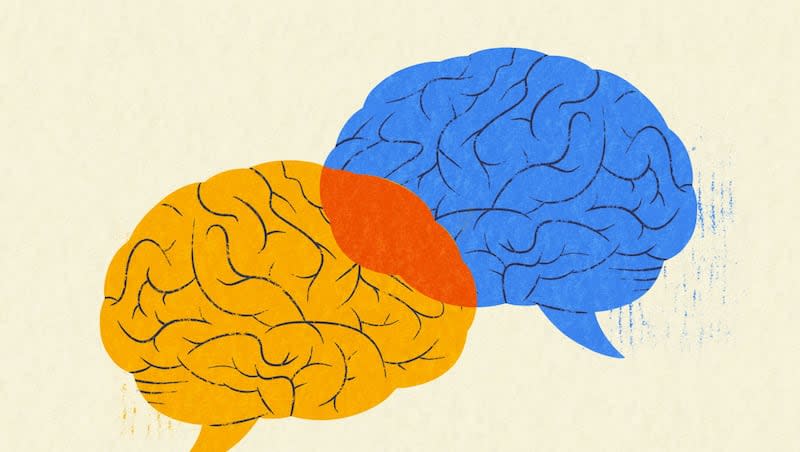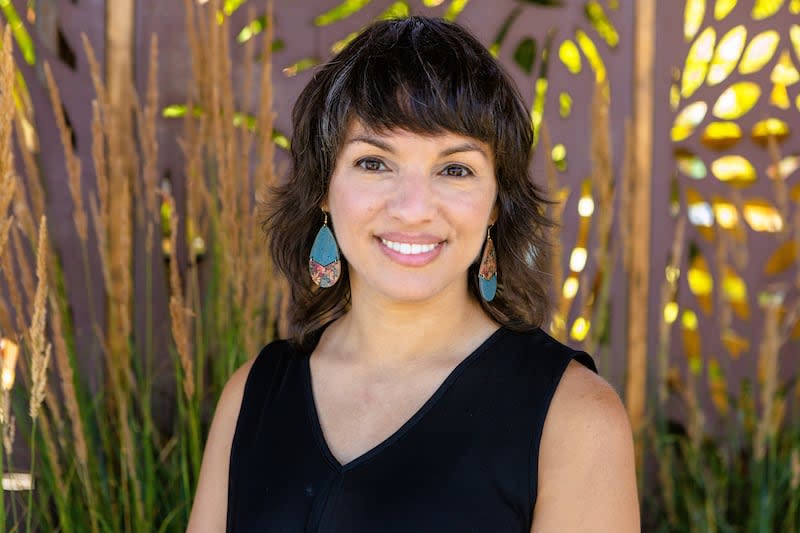Why we need intellectual humility: A conversation with Mónica Guzmán

- Oops!Something went wrong.Please try again later.
Now more than ever, we need to turn to curiosity, humility and civil dialogue to sustain a democratic society. And every college student needs opportunities to develop these virtues and practice these skills so they can bring them into their future workplaces, communities and interactions.
For the Interfaith America podcast, I talked with Mónica Guzmán, a bridgebuilder, journalist and author who lives for great conversations sparked by curious questions. She’s the senior fellow for public practice at Braver Angels, the nonprofit working to depolarize America. She’s also the host of the podcast “A Braver Way” and the author of “I Never Thought of It That Way: How to Have Fearlessly Curious Conversations in Dangerously Divided Times.”
She and I both believe that people in a diverse democracy have a responsibility to engage a range of perspectives with an inquisitive spirit. We explored this topic together in our recent conversation, which touched on the importance of listening, the practices in the Quaker religion and why we shouldn’t be afraid to explore deep, painful questions about the state of our democracy.
This excerpt of the conversation has been edited for clarity and length.
Eboo Patel: If you graduate from flight school, you should be able to fly a plane. If you graduate from a program in civil dialogue where Mónica Guzmán is the author you are reading, what should you be able to do that’s the equivalent of flying a plane?
Mónica Guzmán: You can hear and be heard.
EP: I love it. Say more.
MG: You can hear and be heard. By that I mean, you can hear it all, and you can speak in a way that the power of your story and experience can be present, absorbed and shared. That takes a confrontation with certainty and fear and with our assumptions about certainty and leadership. It takes an inner awareness of the role you play and takes getting past the common refrain that “the world is broken, and it’s their fault, and therefore their responsibility.” To have an effective democratic republic, enough people need to be able to hear and be heard.
We talked about how this is a skill, and we’ve got to learn it. It’s truer to say that it’s not about teaching something, it’s about remembering something. It’s not about learning something, it’s about what you unlearn, because this is not actually rocket science. There are people selling books about it, but it’s not rocket science.
We have been talking, feeling, intuiting and building rituals around this for thousands of years. There are religious, spiritual, psychological and philosophical traditions that have intuited how people work. Right now, because we live in a somewhat more technocratic age, and because it’s the height of education and academia, we want to nail everything down with science, which is awesome, and we’re doing that.
For example, there’s incredible research on intellectual humility. ... The study’s finding was that we now know from research that feeling the emotions of awe and wonder make you more intellectually humble.
EP: Honestly, some of this is kindergarten-level stuff, like share and think of how somebody else feels, it is what many parents and educators teach kids, which is, how do you think the other person feels? The other person is not exactly like you — that’s diversity.
There are all these traditions around this practice. When I was at Oxford, I used to go to a Quaker meeting on Sundays occasionally. In a Quaker meeting, you are silent for an hour unless you feel moved by God to speak. It’s basically a discipline of silence, unless you feel like cosmic lightning is striking you. That is a ritual of sitting with your thoughts in a group of other people.
MG: That’s right. I’m at a nonprofit called Braver Angels, which is all about the political divide, and a woman named Laura is over in Braver Angels–Europe and is a Quaker. She sent me a pamphlet about Quaker practices, but for secular audiences, and I read that short pamphlet with my jaw open.
I didn’t know that there is a religious tradition going back a long time in America that has figured a lot out about listening and giving people space and how it bonds community and brings out real concerns. What Quakers will do when there is dissent is fascinating.
Again, there’s this sense of everything there is to know is in these institutions that have been granted this enormous credibility for nailing down the knowledge that we need, but look at some other places because there’s a deep wisdom there.

EP: We should be happy to think that we are not discovering something, and we are part of a tradition of hearing and being heard. When I was younger, I wanted to be the person who discovered things. As I get older, I want to be part of an ongoing community of people, across generations, that is trying to move the world a millionth of an inch, as Gary Snyder might say. That’s what gives me comfort — I want to be part of a community of people.
Speaking of that, your book is in a community of books with those like Amanda Ripley’s “High Conflict.” In your book, you discuss the dangers of what you call SOS — sorting, othering and siloing — and you write about the importance of conversations that build connections, the underpinnings of which are curiosity and humility. What do you make of this new chapter in an age-old literature of this kind of work?
MG: In some ways, there’s nothing new under the sun, and a lot of traditions already have been talking about some of these ideas, just in different ways. What I think is true about society is much like how you can’t see one love story and say, “That’s it. I don’t want to see any more love stories.” Hollywood keeps giving us the same basic story in different shapes and forms over and over again.
The basic wise ideas of what it means to be human must be reinterpreted for every era with its specific needs, concerns and anxieties. We all get into our own heads, and a lot of us get into our own heads together. We have formed communities in this era, and communication has accelerated that process partly because of technology.
I highly recommend the book “How Minds Change” by David McRaney, whose book is also getting selected for a lot of college reading programs. He used a phrase that I thought was spot on, which is that we need a return to the fundamentals.
In the last 20 years or so, we have spun up, and we have gotten far away from each other and it has felt like we’ve been pulled away from the fundamentals of disagreeing, which is necessary. The fundamentals of thinking — how do we think well and what does that mean? The fundamentals of relationship because clearly it’s really important. We see things like the loneliness epidemic and the huge consciousness about mental health. We are concerned about young people right now because we see some disturbing statistics. And we are concerned about our institutions. Have they lost their way? The trust they have lost — is that because it’s been unearned, or is there something else going on?
We’re asking deep, painful questions, even about the stability of our societies. Those kinds of questions make us freak out, which we’ve been doing, but I think also at some point after a freak-out, what do you do? When you’re calmer, you say, “Let’s start at the beginning.”
Eboo Patel, the founder and president of Interfaith America, is a contributing writer for the Deseret News, the author of “We Need to Build: Field Notes for a Diverse Democracy” and the host of the podcast “Interfaith America with Eboo Patel.”

